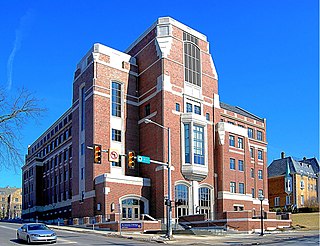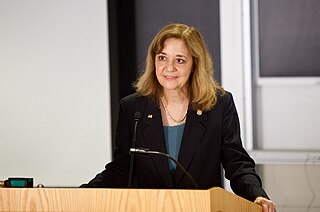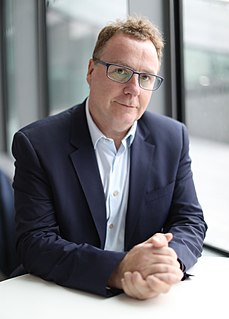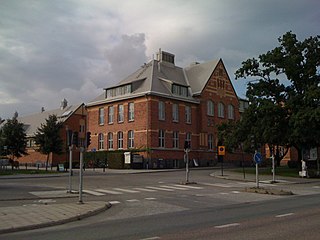
Bernard Joseph White is president emeritus of the University of Illinois and professor emeritus of business at the University of Illinois at Urbana–Champaign. He is dean emeritus of the Stephen M. Ross School of Business and professor emeritus of business administration at the University of Michigan, where he also served as interim president, and Wilbur K. Pierpont Collegiate Professor of Leadership in Management Education. He is the author of The Nature of Leadership and Boards That Excel: Candid Insights and Practical Advice for Directors. Boards That Excel was named Governance Book of the Year for 2014 by Directors and Boards.
Andrew J. Hoffman is a scholar of environmental issues and sustainable enterprise. He is the Holcim (US) Professor of Sustainable Enterprise at the University of Michigan's Ross School of Business and School for Environment and Sustainability (SEAS). His research uses a sociological perspective to understand the cultural and institutional aspects of environmental issues for organizations. In particular, he focuses on the processes by which environmental issues both emerge and evolve as social, political and managerial issues. He has written extensively about: the evolving nature of field level pressures related to environmental issues; the corporate responses that have emerged as a result of those pressures, particularly around the issue of climate change; the interconnected networks among non-governmental organizations and corporations and how those networks influence change processes within cultural and institutional systems; the social and psychological barriers to these change processes; and the underlying cultural values that are engaged when these barriers are overcome. His Ph.D. was conferred by the Massachusetts Institute of Technology in 1995. He is an expert in environmental pollution and has published eighteen books and over one-hundred articles and book chapters.

The Gerald R. Ford School of Public Policy, often referred to as the Ford School, is a leading public policy school at the University of Michigan. Founded in 1914 to offer training in municipal administration, in 1999 the school was named after former President Gerald Ford, who graduated from the University of Michigan in 1935. In the latest U.S. News & World Report rankings, the Ford School was ranked #1 in social policy, #3 in health policy and management, #5 in public policy analysis, #7 in environmental policy and management, and #7 in public affairs overall.

Stephen Michael Ross is an American real estate developer, philanthropist, and sports team owner. Ross is the chairman and majority owner of The Related Companies, a global real estate development firm he founded in 1972. Related is best known for developing the Time Warner Center, where Ross lives and works, as well as the Hudson Yards Redevelopment Project. According to Forbes magazine, Ross has a net worth of $7.6 billion in 2020, ranking him 185 on Forbes Billionaires List in 2020. Having doubled his net worth since 2008, he paid no income taxes in the next decade utilizing the losses on the properties he owned. Ross is also the principal owner of the Miami Dolphins and Hard Rock Stadium.

Marina von Neumann Whitman is an American economist, writer and former automobile executive. She is a professor of business administration and public policy at the University of Michigan's Ross School of Business as well as The Gerald R. Ford School of Public Policy.
Ted London is an American scholar and teacher on Base of the Pyramid (BoP) issues. He is the Ford Motor Company Clinical Professor of Business Administration at the Stephen M. Ross School of Business at the University of Michigan. London is an internationally recognized expert on the intersection of business strategy and poverty alleviation.

The University of Illinois School of Architecture is an academic unit within the College of Fine & Applied Arts at the University of Illinois Urbana-Champaign. The school is organized around four Program Areas - Building Performance, Detail + Fabrication, Health + Well-being, and Urbanism. Faculty teach and conduct research in these areas in support of the School's primary objective to promote critical engagement with the design of a healthy and sustainable built environment.
The traditional MBA degree requires coursework and other study of business from a primarily financial standpoint, with some attention to management of people, to conventional economic theory, and to business ethics. A sustainable MBA program includes these subjects, and also study of managing for environmental and social sustainability. These programs are sometimes called "green MBAs".

The University of Michigan School for Environment and Sustainability (SEAS) is an interdisciplinary professional school focused on the environmental natural and social sciences, environmental justice, and sustainable landscape architecture. SEAS provides graduate-level degrees at the master’s and doctorate levels, along with undergraduate degrees through the Program in the Environment (PitE), a university-wide collaboration.

Claudia Kemfert is a German economics expert in the areas of energy research and environmental protection. She is a Professor of Energy Economics and Sustainability at the Hertie School of Governance in Berlin. She heads the Energy, Transportation, and Environment department at the German Institute for Economic Research.

The Stephen M. Ross School of Business is the business school of the University of Michigan. It is ranked among the best business schools in the world by The Economist, Financial Times, QS World University Rankings, U.S. News & World Report, and Bloomberg Businessweek.

Rosina M. Bierbaum is currently the Roy F. Westin Chair in Natural Economics and Research Professor at the University of Maryland's School of Public Policy. She is also a professor and former dean at the University of Michigan School of Natural Resources and Environment (SNRE). She was hired in October 2001, by then-University of Michigan President, Lee Bollinger. She is also the current Chair of The Scientific and Technical Advisory Panel (STAP) that provides independent scientific and technical advice to the GEF on its policies, strategies, programs, and projects.
James D. Westphal conducts research and teaches in the areas of strategic management and organizational theory at the Stephen M. Ross School of Business, University of Michigan. Westphal’s research examines symbolic management and impression management processes in relations between corporate leaders and firm constituents, as well as social psychological processes in corporate governance and the corporate elite.

Paul Shrivastava is Chief Sustainability Officer and Director of the Sustainability Institute at The Pennsylvania State University. In October 2018 he joined as a full member of the Club of Rome. Previously he was the Executive Director of Future Earth, an international sustainability research programme. Before that, he was Distinguished Professor and Director of the David O'Brien Centre for Sustainable Enterprise at Concordia University.

The institute on the Environment, or IonE, is a multidisciplinary institute at the University of Minnesota that supports interdisciplinary research, develops leaders and builds cross-sector partnerships aimed at shaping solutions to challenges at the intersection of society and the environment. Its director is Jessica Hellmann.

Greg Clark, an urbanist, is an author, global advisor, chairman and non-executive director. Clark has advised more than 200 cities, 50 national governments and a wide array of bodies including the OECD, Brookings Institution, the World Bank and the Urban Land Institute (ULI) on strategies for city development and investment. He also advises global investors and corporate service companies on how to align with city leaders.
Charles Akindiji Akinola is a Nigerian government official, businessman and consultant. He is the Chief of Staff to the Executive Governor, State of Osun. He worked as the Director General of the Office of Economic Development and Partnerships in the state of Osun, Nigeria. He was also a team leader in the Osun Rural Enterprise and Agriculture Program (O-REAP). He has advised State and Federal Governments in Nigeria regarding the design and structure of International Development Cooperation agreements and protocols as well as the management of a wide range of economic development programs. He has participated in the deliberations of the US Government’s Advisory Committee on Voluntary Foreign Aid (ACVFA).
Barbara Ross-Lee, D.O. is an American physician, academic, and the first African-American woman to serve as dean of a U.S. medical school; she is also known as the sister of global music sensation Diana Ross along with being the aunt of actress Tracee Ellis Ross, and singer-songwriters Rhonda Ross Kendrick and Evan Ross. She majored in biology and chemistry at Wayne State University, graduating in 1965. Then, in 1969, she entered Michigan State University's College of Osteopathic Medicine. Ross-Lee then went on to open her own private family practice, teach as a professor, and hold other positions within the medical community. In 1993, she was elected as the first woman dean of a medical school, at Ohio University's Heritage College of Osteopathic Medicine. She has earned several awards and honors for her work and accomplishments.

The Stockholm Resilience Centre (SRC), is a research centre on resilience and sustainability science at Stockholm University. It is a joint initiative between Stockholm University and the Beijer Institute of Ecological Economics at the Royal Swedish Academy of Sciences.

Kyle Powys Whyte is an Indigenous philosopher and climate/environmental justice scholar. He is a Professor of Environment and Sustainability and George Willis Pack Professor at the University of Michigan's School for Environment and Sustainability. Whyte formally served as the Timnick Chair in the Humanities in the Department of Philosophy at Michigan State University's College of Arts & Letters.













